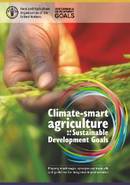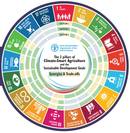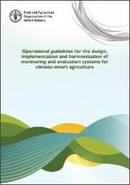Publicaciones
The main objective of this training module is to help project designers and implementers develop their capacity to integrate gender issues in CSA projects and programs. As a result of the training, learners are expected to have a better understanding of the gender roles in CSA and their critical impact on project outcomes and sustainability. The training will also provide different methods and tools enabling learners to identify, formulate, implement, monitor, and evaluate gender-responsive actions and practices in CSA development projects.
This publication presents an assessment and mapping of CSA-SDG interlinkages. These provide entry points for targeted CSA planning to enhance synergies and reduce potential trade-offs between CSA objectives and SDGs. The publication also provides guidelines for the integration of the CSA implementation steps with the 2030 Agenda.
A flyer looking at the 5 implementation steps of Climate-Smart Agriculture and the Sustainable Development Goals, as well as the synergies & Trade-offs.
These operational guidelines aim to address the core constraints and needs of FAO Member States on both the design and implementation of M&E systems that can simultaneously address CSA and sector reporting requirements for the 2030 Agenda, the Sendai Framework and the UNFCCC Paris Agreement.
The main objective of this report is to review the monitoring and evaluation (M&E) frameworks, tools and guidance documents that are available for Climate-Smart Agriculture (CSA), and in particular for objective (“pillar”) two on adaptation and resilience. The report is a literature review and does not propose a new methodology. It is not an exhaustive list, but summarises the main M&E frameworks.





